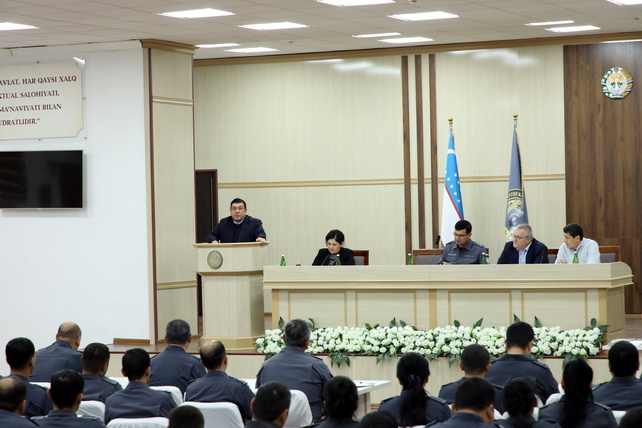
"The Light of Knowledge and Hope": Book donation ceremony at women’s correctional facility
"The Light of Knowledge and Hope": Book donation ceremony at women’s correctional facility
Tashkent, Uzbekistan (UzDaily.com) — On 19 December 2024, a ceremony took place at the cultural center of the "Sadokat" park in the Zangiata district of Tashkent region, where educational materials, books on human rights, and personal hygiene items were donated to women incarcerated at Correctional Facility No. 21 in Zangiata district.
The event was organized by the National Human Rights Center of the Republic of Uzbekistan, in collaboration with the OSCE Project Coordinator in Uzbekistan and the Department of Corrections of the Ministry of Internal Affairs.
The purpose of the initiative was to provide incarcerated women with access to educational and legal literature, as well as to improve sanitary and hygienic conditions in the facility.
The ceremony was attended by Ambassador A. Karttunen, OSCE Project Coordinator in Uzbekistan, O. Satimbaev, Deputy Head of the Department of Corrections at the Ministry of Internal Affairs of Uzbekistan, G. Karimova, Head of Correctional Facility No. 21, M. Tillaboev, First Deputy Director of the National Human Rights Center, D. Muratova, Deputy Director of the National Human Rights Center, and officials and staff from the Department of Corrections.
As M. Tillaboev noted, over 600 units of literature were donated, including issues of the magazine "Democratization and Human Rights," as well as personal hygiene items. He emphasized that Uzbekistan is actively taking measures to fulfill its international obligations in the field of human rights, including the protection of the rights of women, children, and the prevention of torture. Special attention is being given to the implementation of international human rights standards, which have received constitutional status.
Ambassador A. Karttunen emphasized that this initiative is part of the project "Support for the Promotion of the National Mechanism for Gender Equality" and is a continuation of work started at the expert roundtable "Gender-Sensitive Strategies for Managing Correctional Facilities: Best Practices and Key Issues," held on October 31 this year. He noted that the event aligns with the recommendations of the Committee on the Elimination of Discrimination against Women (CEDAW) and is aimed at improving conditions for women in detention, including ensuring a gender-sensitive approach, improving sanitary conditions, providing access to personal hygiene products, and offering educational and cultural development opportunities.
O. Satimbaev spoke about recent legislative changes aimed at humanizing the conditions of detention, including expanding rights to communication with relatives, access to education, and medical care. He also noted the provision of access to correctional facilities for representatives of the Ombudsman, the National Human Rights Center, and other authorized bodies.
G. Karimova highlighted the important role of books in the rehabilitation process of detainees and noted that the facility has created all necessary conditions for access to library resources.
As D. Muratova pointed out, the ongoing reforms aim to ensure human rights and freedoms and align with the new constitutional and legal framework. The primary goal of updating the library resources of the facility is to help people in difficult life situations reintegrate into society and provide them with a chance for a new life.